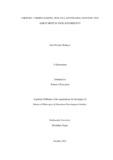
Please use this identifier to cite or link to this item:
https://hdl.handle.net/20.500.14301/248| Title: | FARMERS’ UNDERSTANDING, PRACTICE, KNOWLEDGE TRANSFER AND ADJUSTMENT IN FOOD SOVEREIGNTY |
| Authors: | Mushyan, Hari Krishna |
| Citation: | Mushyan,H.K.(2013).Farmers’ understanding, practice, knowledge transfer and adjustment in food sovereignty. |
| Issue Date: | Oct-2013 |
| School: | SOED |
| Department: | DODE |
| Level: | M.Phil. |
| Program: | MPhil in Development Studies |
| Abstract: | The study explored and described the farmers’ understanding, practices, the way of knowledge transfer and the techniques they adopted to make adjustment in reference to food sovereignty. Farmers as the producers of food need to be free in determining the quality, the quantity and the method they apply for the production of the crops of their choice. Despite the articulation of food sovereignty in the Interim Constitution-2007 and ratification of global movement of La Via Campesina, there exists indifference for the implementation of this concern. Three research questions manifesting to understanding, practice, knowledge transfer and adjustment were designed to lead this study. The study employed qualitative research methodology and adopted the narrative mode of inquiry where I generated four stories from the participants. The study was conducted applying rigorous field visit and prolonged interactions with the farmers of Kushadevi VDC of Kavrepalanchowk district. Four participants who contributed to unpacking the concern of this study were selected using purposive sampling paying attention to rich information case and the access I could get. I ii conducted in-depth interviews with my participants and verified their sayings as member check and then developed stories of their narratives. I maintained the quality standards throughout my study by practicing substantial description, trustworthiness and consistency in information. I obtained consent from the participants before collecting information and maintained a right to withdrawal as they wish. There emerged seven diverse themes to answer the first research question. Likewise, I generated two themes to explicate the answer to the second research question. Similarly, five different themes were generated to answer the third research question. The study found out that the participants were aware of their rights and food sovereignty. At the same time, they were also found to be practicing these to some extent. In terms of knowledge transfer, the study found both positive and negative effects. The positive effects were: growing networks, formation of local groups, increased awareness, and practiced beneficial agricultural methods. Similarly, the negative effects were: excessive use of chemical fertilizers, and hybrid seeds. As a result, I found that farmers were adjusted to those new dynamics by network building, trying out commercial vegetable farming, selling their products in the local markets and awareness building towards production of quality food by narrowing relation between food producers and consumers. Thus, this study brought forward the issues about farmers’ understanding, practice and their adjustment in food sovereignty in the Nepalese context. The study implied that there is the urgency for the farmers to apply ecological farming to sustain their endeavors. At the same time, it is also important to transfer an appropriate technology to the local for agricultural sustainability. For the policy makers, this study indicates the need for designing and implementing policies that iii reach to the grassroots levels. Besides, there requires proper micro-level studies to explore the complex issue of food sovereignty so as to advocate the good practices about ecological farming in the country. |
| URI: | https://hdl.handle.net/20.500.14301/248 |
| Appears in Collections: | Dissertations |
Files in This Item:
| File | Description | Size | Format | |
|---|---|---|---|---|
| Hari Mushyan MPhil Thesis.pdf | 1.24 MB | Adobe PDF |  View/Open |
Items in DSpace are protected by copyright, with all rights reserved, unless otherwise indicated.